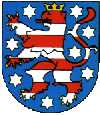 Thüringen - (Thuringia)
Thüringen - (Thuringia)  Thüringen - (Thuringia)
Thüringen - (Thuringia) Starting at the capital ERFURT, in the center of the state, which actually suffered relatively less damage in WWII, thereby preserving much of it's cultural attractions. For some reason, the city was also lucky in that the Commies didn't totally ruin it either. The local soccer club is relatively non-descript, RW Erfurt, but worth checking out.
Heading east for about 20km, we arrive at the world-famous city of WEIMAR, which is probably most closely etched in history students minds as the soul of the failed Republic. Aside from that, the reason it's on the map is due to folks like Goethe and Schiller. I think they were co-captains of Germany's 1954 World Cup win, although they also wrote a few novels and things. Another famous resident was the philosopher Freddy Nietzsche, who inspired the Superman comic books with his Übermensch theories. He was fond of saying things like "Man, when you go to woman, don't forget your whip.". (Funny thing to say, since your grandma could have probably taken the whip away from him and given him a good ass-kicking.) Nietzsche was also a famed footballer. (To read about his soccer exploits, read here ). Unfortunately, like most cultural cities, the soccer tradition is fairly lame. The only club of note is SC Weimar 1903, and they appear to be fairly crappy. So best to buy your souvenir Goethe beer mug or Schiller shot glass, and head a further 20 km east to the city of JENA. The city is dominated by the famous Univerisity and the Carl-Zeiss works. The university dates back to the Middle Ages, although it's Communist-era architected new building is the dominant feature of the Jena skyline. The locals refer to it as Jenaer Pimmel (Jena's Willie), which refers to it's, err, phallic design. Carl Zeiss is of course a world famous optics company, but their most important contribution to the world is sponsorship of several soccer clubs, including the local FC Carl Zeiss Jena.
Another 35 km down the road is the town of GERA, which is actually the 2nd largest city in Thüringen. The city itself is basically ho-hum, but there is a pretty decent soccer culture, albeit at the lower divisions. Among the teams are 1.SV Gera, VfL Gera and Carl Zeiss Gera. The latter will change it's name to Lusaner SC in 1998 to reflect it's district base. If you're on your way to Chemnitz, you might want to stop in the town of ALTENBURG, which is about half an hour east of Gera. This is your run-of-the-mill medieval town whose main claim to fame is that it is Germany's Skat capital. This is not mumbo-jumbo singing, but rather a bizarre card game that only Germans could love. It was basically invented in a pub by some guys playing cards. They got too drunk and lost about half the deck, so they invented the game Skat so they could keep playing. Altenburg is famous for producing Skat cards, and I guess they are so busy they can't play any soccer. If you would like cause a bit of excitement for the locals, take your 99 cent card deck you bought at K-Mart, lose some of the cards and claim to have an original American Skat deck. Otherwise, continue on to the Karl-Marx vs. Ronald McDonald match in Chemnitz.
If you head south of Erfurt, you'll run into the forests of the Thüringer Wald. No soccer here. Heading west, again the soccer pickings are slim. The town of EISENACH is famed as the birthplace of Johann Sebastian Bach. Although best known for his music, it is a little known fact that Bach also was a soccer fan. In fact, he desperately wanted to coach his own team. But his patrons insisted that he keep composing cantatas and concertos, so in desperation he decided to form his own team by supplying his own players - he had something like 20 kids so he could field a full squad plus bench. Unfortunately, the soccer tradition is completely ignored, so you'll have to settle for a visit to the Bachhaus.
Tucked away in the northeast corner of the state is the town of NORDHAUSEN, which is just south of the Harz mountains. This is mainly an industrial city, best known for it's production of Korn, which is an alcohol that also can be used if you run out of rocket fuel. There is a scrappy little club Wacker Nordhausen that is worth checking out.
(c) Abseits Guide to Germany : www.abseits-soccer.com